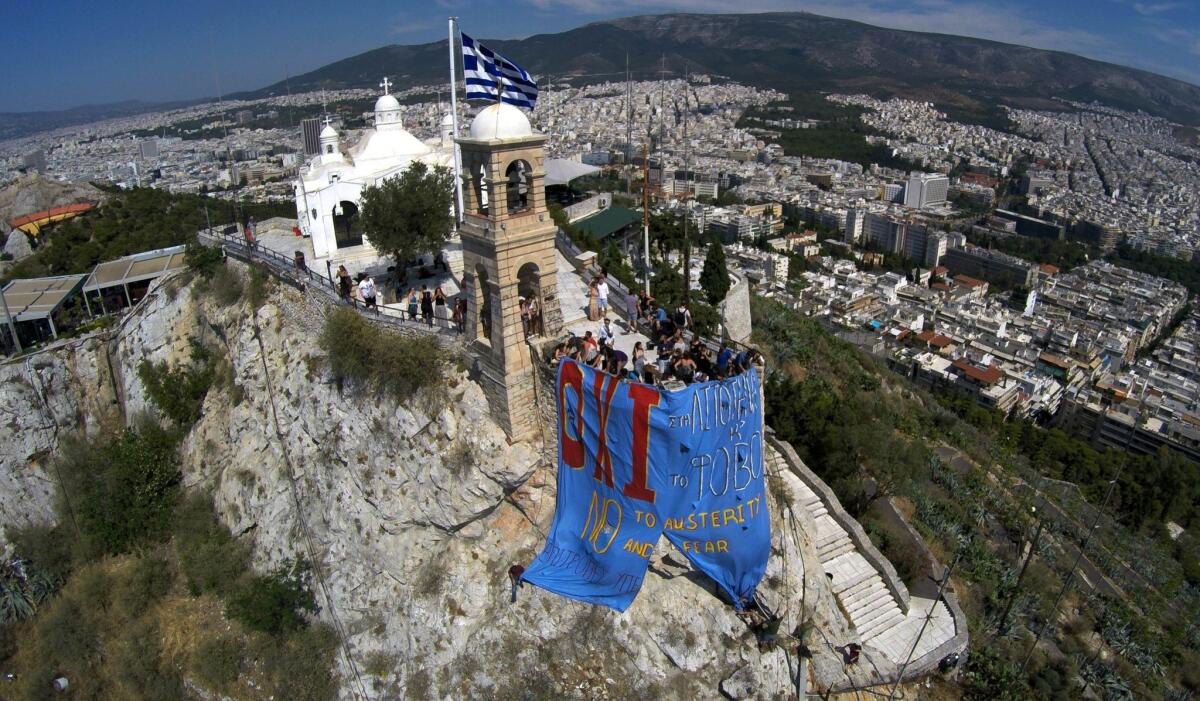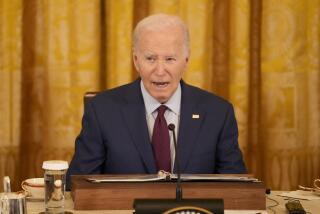Greeks warned that rejecting bailout terms won’t elicit better offer

Supporters of a “no” vote in the Greek referendum on a bailout plan for country hang a banner reading in Greek and English ‘’NO to austerity and fear’’ atop Lycabettus hill in Athens on July 2.
International lenders owed $270 billion from Greece for five years of bailouts warned Thursday that a “no” vote in a referendum on their final offer for another extension won’t elicit an easing of its austerity terms.
Jeroen Dijsselbloem, head of the Eurogroup that coordinates monetary policy for the 19 countries using the euro currency, urged Greek voters to not take the advice of their government, which argues that voting against the new lending proposals in Sunday’s referendum will force creditors to ease their austerity demands.
“The Greek government is rejecting everything with the suggestion that if you vote ‘no’ you will get a better or less tough or more friendly package. That suggestion is simply wrong,” Dijsselbloem, who is also the Dutch finance minister, said before a parliamentary committee in the Netherlands.
Negotiations between Greek leaders and the “troika” of lenders -- the International Monetary Fund, the European Central Bank and the European Commission that includes the Eurozone countries -- broke down Saturday after Greek Prime Minister Alexis Tsipras called the referendum to put the decision on whether to accept the latest rescue package to voters.
Tsipras and his radical leftist government have been campaigning for a “no” vote, telling voters that rejection will compel the lenders to back off from their insistence that Athens raise the money it needs to repay its staggering debt by making even deeper cuts to public spending as well as raising taxes on business.
Polling has long suggested that most Greeks want to retain the euro as their currency. However, the latest clash between the Athens government and its lenders has heightened uncertainty about the outcome of Sunday’s vote.
A poll conducted this week by the ProRata institute found that 54% of Greeks surveyed said they planned to vote against the terms for a new bailout. On Thursday, however, another poll published by the Euro2day website reported 47% planning to endorse the deal and 43% inclined to reject it.
Greek Finance Minister Yanis Varoufakis stepped up his opposition to accepting the creditors’ demands. He told Bloomberg in an interview that “I prefer to cut my arm off” rather than sign any deal that didn’t ease the repayment schedule. Varoufakis said he would resign if the “yes” vote prevails on Sunday.
Leaders of former Greek governments have joined the creditors in warning voters against expecting new concessions if they reject the bailout terms on Sunday. Former Prime Minister Costas Karamanlis on Thursday joined others in warning of even more hardship if the “no” vote wins.
Greece’s Eurozone colleagues have been urging voters to accept the creditors’ offer, even though it technically expired with Tuesday’s default, saying only a “yes” vote will open the way for renewed negotiations on a third bailout.
“The consequences are not the same if it’s a yes or no,” French President Francois Hollande told reporters in Benin at the start of a two-day African visit. “If it’s the yes, even if it’s on the basis of proposals that have already expired, negotiations can resume and I imagine be quickly concluded. We are in something of an unknown.”
Religious leaders across Europe have urged Greeks to unite in their tackling of the nearly 6-year-old economic crisis, fearing the deepening social division could escalate into violent confrontation.
A report issued by the IMF on Thursday cast blame for Greece’s protracted economic crisis on the government, noting that privatization plans outlined in the previous bailout agreement haven’t been executed. The global lending agency called in 2011 for Athens to raise $56 billion by the end of this year by selling off state assets, but the country has so far earned only $3.5 billion through privatization.
The IMF analysis, prepared before Greece defaulted on a $1.8-billion loan payment on Tuesday, also warned creditors that they will have to provide the country with at least $56 billion more in debt relief through 2018 to keep it afloat and that they would need to discount interest rates and prolong the repayment period if a third bailout is agreed.
The second of Greece’s two international bailouts since 2010 expired on Tuesday, three days after the collapse of talks aimed at getting Athens the last of its cash infusions so it could pay the IMF bill, a precondition to working out a third bailout plan.
The Greek government walked away from the creditors’ last offer in opposition to its requirement that Athens phase out a pension supplement for 200,000 of the country’s poorest retirees.
Tsipras and his government also reject the lenders’ demands for an end to the 30% discount on value-added taxes for Greek island businesses, where the tourism industry responsible for at least 17% of gross domestic product is concentrated.
Follow @cjwilliamslat for the latest international news 24/7
More to Read
Start your day right
Sign up for Essential California for news, features and recommendations from the L.A. Times and beyond in your inbox six days a week.
You may occasionally receive promotional content from the Los Angeles Times.






